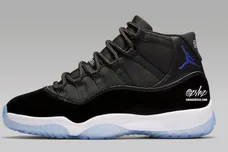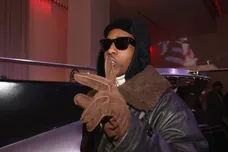In late 2008, XXL revealed to the world the names who would make up their 2009 Freshman Class. Alongside the likes of Asher Roth, B.O.B, Ace Hood and Curren$y, two now-familiar rappers were introduced to a mainstream hip-hop audience: Kid Cudi and Wale. The former, hailing from the city of Cleveland, and the latter, a native of Washington, D.C., followed surprisingly similar career paths to score eventual debut albums that were both warmly received on their own, but also pointed to sustained success in the music industry, as both Cudi and Wale have carefully honed their respective sounds and chartered their own distinctive courses through hip-hop music in the years since. As a result, they've both accumulated fan bases that are unfailingly loyal, even in the face of critical bewilderment as time has trudged on into the 2010's.
At the time, both rappers were coming off of mixtapes that propelled them to the front of the underground conversation. In July 2008, Kid Cudi dropped A Kid Named Cudi, releasing the project as a free download. It was a significant move that predates the streaming world we live in now where artists get paid, yet barely anyone buys physical copies of mixtapes anymore, digital or otherwise. However, where money was lost, a career was gained in the end, after Kanye West took notice of the tape and, as their relationship grew from pleasant acquaintances to something resembling a mentor-mentee situation, eventually signed the young emcee to his GOOD Music imprint. He even co-wrote the tracks "Heartless" and "Paranoid," as well as others, for Kanye's 808's and Heartbreak LP. Suffice it to say, the music world was quickly becoming familiar with Cudi's work. His debut album was soon one of the most anticipated commodities the rap game had to offer in 2009.
As for Wale, his name had been floating in and out of music industry circles as far back as 2006. His first big slice of exposure to a wider audience was at the 2007 MTV Video Music Awards, where he performed a remix to Justice's "D.A.N.C.E." that was off his mixtape 100 Miles. Then, in 2008, Wale gifted hip-hop heads with the Seinfeld-inspired Mixtape About Nothing, which linked the TV show's honest dialogue to his similarly filter-free lyrical style. His follow-up, 2009's Back To The Feature, made even more industry pundits take notice of a man who poised to assume the role of a hip-hop leading man. The project, whose title played on the fact that Wale was mostly known to mainstream audiences for his feature work at the time, foreshadowed his hunger to take that next step, along with Cudi, out of the dusty confines of the cult scene he operated in and make his first move towards stardom.
Released two months apart, Cudi's Man On The Moon: The End Of Day officially made its way to the music marketplace on September 15th, 2009, while Wale's Attention Deficit bowed on November 10th. The DMV native's LP was distributed with the help of Interscope Records, a name that has had many storied acts from the pantheon of hip-hop associated with it over the years. Cudi found himself sandwiched between two highly-regarded Kanye West releases on GOOD Music, positioning himself as a rapper who was after some long-form artistic integrity, rather than being focused on chasing that hit radio single (which he ended up getting anyways, once Crookers remixed "Day 'n' Night"). Both albums achieved both commercial and critical success, but which one will win this battle of the debut albums? Let's get into it!
Production
As far as helping hands on freshman projects go, both Kid Cudi and Wale had an embarrassment of riches at their disposal when it came time to fashion their proper full-length debuts, outside of mixtape culture. As was mentioned earlier, Cudi was working under the tutelage of Kanye West, one of the most singular voices in hip-hop from both a writing and production standpoint. Man On The Moon can border on sonic thievery at times, working at a slow, deliberate pace that is not unlike what Yeezy broke the mold with on 808's. Tracks like "Simple As...." and "Sky Might Fall" sound like they could've had nearly the same sonic outcome had they been performed by West instead of Cudi. Working with producers Haynie and Ratatat, there's also this distinctive new wave flavor to many of the songs included on Moon, edging closer to indie rock in many cases where the instrumentals are concerned. As with Kanye's post-Graduation style, there's a darker, more brooding sound here that was not ingrained as deep in the fabric of Cudi's mixtapes as it is on this record.
Wale was operating from a different vantage point, that of the quick-witted quipster who is still able to deliver those punchlines at top speed. The production on Attention Deficit is definitely not as atmospheric as what you hear on Man On The Moon, and as a result, Wale isn't as prone to getting swallowed up in this giant pool of beats and synths as some critics felt Cudi did one or two too many times. Instead, there's a classic feel to a lot of the instrumentation on the D.C. rapper's debut, pulling from classic funk and soul records for inspirations and, in some cases, direct sampling. His producer lineup showcases that willingness to go for the catchy hook, with pre-"Uptown Funk" Mark Ronson, Best Kept Secret and The Neptunes all giving Wale an assist behind the board. Features from Bun B, Pharrell and J. Cole, among others, only augment the chosen stylistic approach, with brass and piano chords playfully lilting over the vocal delivery of nearly every track. The result is an album that felt both immediate and retro, a line that Wale toed long before it was considered trendy or even necessary for commercial success. There's a case to be made that, had Attention come out five years later than it did, it would've been a much bigger hit with the general public.
Moon is an out-and-out concept album, which appealed more to a fan base that was in search of the raw emotion and in-depth storytelling that certain factions of the rap music world felt devoid of at the time. Attention was not in this category, preferring to go about the LP's construction from a song-by-song point of view, instead of inserting an overarching storyline.
Lyrics
Lyrically, both albums dip toes in the political arena as well as deal with some strong sentimentalism, but the approaches are wildly different. Kid Cudi has long been about providing a strong message behind his music, rather than just churning out inane party music. To do that, the writing of a rapper's rhymes must be intensely personal, which is definitely the case for a good number of songs on Man On The Moon. "Day 'n' Nite," for example, was written shortly after Cudi's uncle passed away, a man that he was not on speaking terms with, the result of anger that stemmed from a bygone feud during his teenage years. The bitterness he feels towards himself for not apologizing to his family member before their passing turns a song that reads more like angst and loneliness morphs into a sad bit of poetry about regret, as witnessed by the opening lines of the first verse:
Day and night
I toss and turn
I keep stress in my mind, mind
I look for peace
But see I don't attain
What I need for keeps
This silly game we play, play
As for Wale, he blends humor with blunt realism, playful zingers with deceptively sharp social commentary. On the song "90210," he talks about the stereotypical actress/model types that populate Los Angeles, positioning his targets as regular girls with celebrity dreams.
She live her whole life like T.V
And she would do anything for everything
Regular girl, Celebrity dreams
She is 90210
Later on in the track, he recounts the story of a day out with one of these women, communicating a sense of emptiness in the proceedings that he finds particularly disheartening. In his mind, the girl is distracted by all of the fake, shiny things that her illusions of fame present before her, instead of investing in the living, breathing human being that she has sitting right next to her.
Just another day out in Beverly Hills
She sing, model, and dance, but can't sit still
Believing the screens or anything there
But reality shows ain't real
So pretentious with no potential
She goes to catch up, although her rent's up
In her defense she a part of the crowd
She going to borrow some money
So she can party at Chows
Both rappers effectively communicate the pain behind the playa, but Cudi does it in a more abstract way than Wale does. One approach is more subtle than the other but, as I said before, the methods have their own distinctive ways of accomplishing the same goals.
Impact
If you're judging the merits of either Attention Deficit or Man On The Moon from a commercial standpoint, there it's no contest. Cudi's debut sold approximately 104,000 copies in its first week of release, dwarfing Wale's paltry figure of 28,000. In July of 2017, Moon was certified 2x Platinum by the RIAA, after crossing the 2 million unit threshold with sales plus streaming figures. However, despite being a far bigger commercial success to this day, critics were arguably kinder to Wale's album, praising his speed and dexterity while spitting bars that could be alternatively over-the-top (read: the Jeremy Shockey reference) and brutally real. Conversely, Cudi was seen as a pretty pedestrian rapper at the time, someone who needed to up the ante in terms of the energy and flow behind his rhymes. While those are debatable statements when considering either artist's entire body of work, it's an interesting comparison for two men who have seen their careers differ from each other since 2009, but as far as their debuts are concerned, they're much more similar that listeners might give the theory credit for.
Who do you think had the better debut - Kid Cudi or Wale? Vote below!









